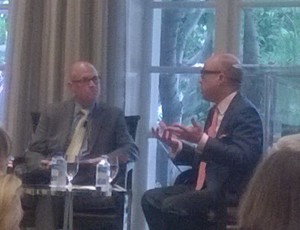 Today I attended a “A Philanthropic Journey: A Conversation with Darren Walker.” The lecture is part of the USC Center on Philanthropy and Public Policy’s Distinguished Speakers series. Darren has led the Ford Foundation for a little more than a year. In this short time, he has made quite a mark on the organization. The Foundation works “on the frontlines of social change around the world, working with visionary leaders and organizations to change social structures and institutions—so that everyone has the opportunity to achieve their full potential and have a voice in decisions that affect them.” Darren has more than two decades of nonprofit and philanthropic leadership focusing on social justice. The conversation was conducted by Fred Ali, CEO of the Weingart Foundation.
Today I attended a “A Philanthropic Journey: A Conversation with Darren Walker.” The lecture is part of the USC Center on Philanthropy and Public Policy’s Distinguished Speakers series. Darren has led the Ford Foundation for a little more than a year. In this short time, he has made quite a mark on the organization. The Foundation works “on the frontlines of social change around the world, working with visionary leaders and organizations to change social structures and institutions—so that everyone has the opportunity to achieve their full potential and have a voice in decisions that affect them.” Darren has more than two decades of nonprofit and philanthropic leadership focusing on social justice. The conversation was conducted by Fred Ali, CEO of the Weingart Foundation.
He talked a lot about leadership. “Look disruptively at building a team. Leadership and success today are not often correlated to empathy, or human understanding, but to spreadsheets and apps. Strategy can be alluring, plus you can put it in a PowerPoint! Culture is messy. That is real leadership.” He focuses on culture and his staff on strategy. He brought in an incredible team that puts more pressure on him to deliver. “We under optimize the privilege we have. We have become institutionalized, metrics have taken us away from the urgency and the passion. People need to feel the sense of urgency.”
His trajectory has been a result of public and private intersections. Educationally, he says, the Ford Foundation gave a grant to Yale to do research that led to the establishment of Head Start, a program that helped Darren as a child. In college, a Pell Grant and philanthropy got him through school. What prepared him most in life was his first job, that of a busboy in 7th grade. “Amazing what you hear about humanity when you are invisible, you learn a lot.” For this job, he was an internal candidate. “Boards haven’t always valued internal talent. Organizations have not always prepared staff to become CEOs. Ford was different.”
“It can be frustrating when a new leader comes in and “the old” needs to be blown up. I don’t think it works. It’s too personally driven. What we are doing is iterating over time, deepening grant making in our focus areas. We work in complex systems, logical frameworks don’t always work. We need to put the institution at the center and we are the supporters. Too much of the time incentives are against collaborations. It’s about what did we get? What are we buying? What credit did we get? Boards need to push for collaboration.” He hopes that we are past the tired discourse of the last 10 years. “Is it strategic or not? If messy, it could create impact.”
Lastly, research. “You have got to connect action to the research. Otherwise it’s just a report in a file. At USC, I see the research in action such as with The White House project on Federal Public Private Partnerships.
He sprinkled much humor in his remarks. He talked about the great leaders of philanthropy whose institutions live today, how times have changed, and what they must think: “John D. Rockefeller with the Rockefeller Foundation being headed by a Jewish Female, Andrew Carnegie and the Carnegie Corporate headed by an Armenian Immigrant and Henry Ford and the Ford Foundation led by a Black Gay!”
